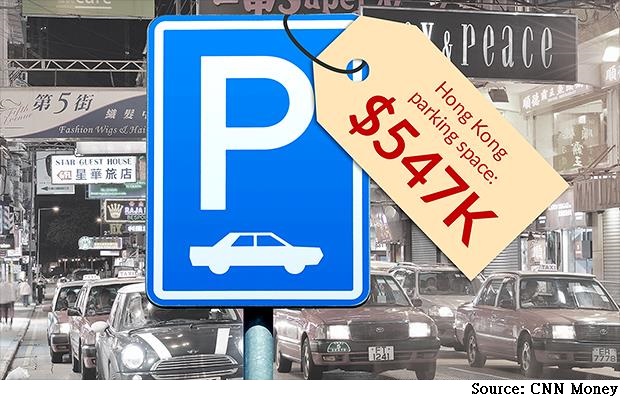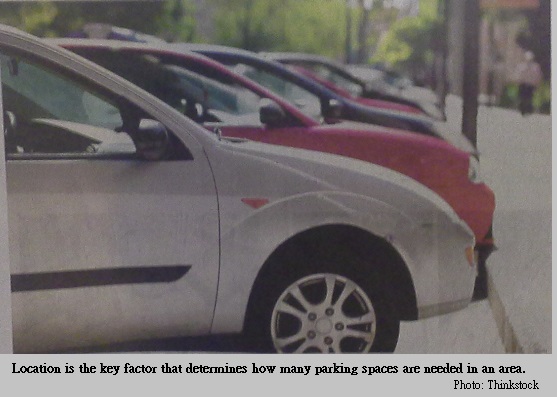Finding a parking space is a competitive business in Hong Kong
Hong Kong is one of the most vibrant but also congested and expensive cities in the world.
Finding a parking space is a competitive business. read more
When they got off for sales, single space changed hand in Hong Kong for hundreds and thousands of dollards. Tim McDonald reports.
In and out of the city, it is tough to find a space to park, and there is always someone who smells the business opportunity.
" This is my car park here, a tiny little one but in the heart of Hong Kong. I operated this car park over 15 years. " That is Josh Wong.
There is room for may be a dozen car parks , with the attendant constantly rearranging them like a puzzle trying to fit more in.
"According to government figures, there are about 600,000 registered private vechiles in Hong Kong, there are also roughly 600,000 parking spaces in Hong Kong. Theoretically its one to one , should be ok."
"But if you take your car out to shopping arcade or you take your car out to work, you need at least double the parking spaces."
Out on the street, a rival makes money as a sort of informal valet , moving cars between meter spaces before the parking inspector tickets them. Of course another option is to rent a space by the month or even buy one. Parkinghk.com received almost 100 eqnuiries a day.
Its not just people who want to put their car but investor who may think they may turn a profit.
"80% of the people buying parking space would be looking forward to capital appreciation. Its very unlikely that a car owner would buy a parking space just park a car. Its not justifiable."
Some invest because they dont have quite enough money to buy an apartment in this notoriously expensive city. It also helps the transaction tax for parking space is much less than for an apartment.
In this noisy corner of Hong Kong Westend., a space went for staggering US$660,000, now thats a record ! Across the road there is a public spot where you can get a space for about US$382 a month.
This is a city where a lot of monty doesnt necessarily go far. Increasingly developers are selling nano flat ,actually are not whole lot larger than a parking space, Some cases there are not more expensive either.
Dennis Ma is the head of Research of Hong Kong real estate firm, Jone Lang Laselle."You are looking at an average amount of US$200,000 for 200 square foot unit. We will say a lot coming up to the market. I think what it shows you the property market is hot in general. It does not matter whether you talk about commercial property or residential property, now even car parking. Rental yield are not very high for parking spaces , but the price is going up."
Thats because Planning Board has reduced the number of parking spaces required for each apartment. So the number of cars is increasing more quickly than the number of spaces.
Of course if parking just makes car ownership too expensive, you can just do what other 4 million people here do everyday, and just take public transport.


北區養車難 泊位短缺租金升
Chinese Version Only
近年北區不少臨時停車場被政府收回重新發展,其中三幅位於粉嶺聯和墟,令該區泊車位出現嚴重短缺。一泊位難求,有人違例泊車,亦有車主選擇「捱貴租」。有停車場負責人估計,明年停車場收費有上調空間,養車愈來愈貴。
聯和墟車位難求,社區幹事曾興隆憶述有街坊吐苦水,抱怨「搵車位難過中六合彩」,指一旦政府收回露天停車場的地皮,車位供應更加緊絀。他舉例說今年拍賣出一幅位於聯發街、聯富街與聯益街交界的用地後,在少了約一百六十個車位,停車場收費有升無跌,「榮福、榮輝中心月租升近二千元,新屋苑逸峯車位更高達二千八百五十元租,仍有人搶。」有車主歸咎於聯和墟並無政府管轄的多層停車場,而有夜泊服務的露天停車場,車位僧多粥少。據悉,該區公眾泊車位約七百個。記者實地視察,位於聯發街、聯富街與聯益街交界處的金倉停車場,泊位不足一百,月租一千八百元,使用率甚高,至於有蓋停車場一般只提供時租服務,反映「車位錯配」情況嚴重。雖說未來逸峯和瓏山一號相繼落成,為聯和墟提供新車位,但翻查資料,兩大新屋苑合共九百伙,然而供私家車停泊的車位不足二百個,難以滿足全部有車階級使用,屆時車位需求進一步加劇,車主預備捱貴租。
政府搶地重新發展
所有停車場大部分按供求理論決定車位租金,價位可升可跌,車位短缺的地區升幅較大read more
,例如尖沙嘴中間道停車場結束營運後,附近停車場收費即有所變動。而受通脹、最低工資等因素影響,他保守估計明年車位收費會升百分之五至十。在車位供求嚴重失衡下,違例泊車愈來愈猖狂。粉嶺居民何先生怒斥車主「有恃無恐」,指原本路口無雙黃綫,後來見大車路窄難通過先補加,怎料近幾年,所有雙黃、單黃綫均泊滿車,「警方抄幾多次牌也無補於事,馬路很快故態復萌。」北區民政處表示,政府一直有留意區內泊車位的供求情況,地政處和運輸署會按情況,繼續物色適當土地,作臨時停車場之用。曾興隆亦引述警方建議,為舒緩車位不足,指短期內會將現時聯和舊街市對出的小巴站、的士站改為車位,能暫泊二三十架車。但從客觀環境來看,他指聯和墟難有大型停車設施,應規劃附近工業區土地作泊車之用。
爛地生財
經營停車場生意二十年的黃先生,私家地、政府地和多層停車場也做過,他指由官地判出來做臨時停車場,受地契所限,掣肘較多。他舉例說北區面積雖大,但工業地、農地不能改為商業停車場,除非地契有列明,而交通配套亦是考慮因素之一。他表示,經營停車場入行門檻不高,但生存不易,除了兩三間由發展商控制的公司,小本經營的「十隻手指數得晒」。黃坦言地政署推出可作停車場的地有限,「有一兩年更無地拍賣。」
US$547,000 for a parking space in Hong Kong
Forget a sea view mansion. In Hong Kong, parking spaces are some of the hottest properties on the market.
Eager buyers in this densely populated city have pushed prices to record highs in recent months, with prime spaces now selling for far more than the luxury cars that park in them.
In May, a single space in a residential neighborhood on Hong Kong Island went for 4.24 million Hong Kong dollars ($547,000), making it the most expensive parking space ever sold in the territory.
The quirky market is being driven by a combination of factors: Low supply, high demand, and speculators who view parking spaces as a potentially lucrative investment opportunity.
"I am surprised how much interest there is on the market about buying and selling parking spaces," said KK Wong of Hong Kong City Parking. "Five years back, nobody would even be asking." read more
With land at a premium, most Hong Kong homes don't come with a driveway or garage, and even luxury apartment buildings don't always offer car parking. The result is a total of 683,000 parking spots for a population that exceeds 7 million.
The parking spot craze started heating up a few years ago, when the city government introduced new taxes to help cool the residential property market and drive out speculators.
The strategy worked, but some investors shifted their money into parking spaces, which were exempt from the tax. Owners were able to resell the tiny properties, or rent them out for a profit.
Wong, who operates several parking lots and a listings website, said the flood of new investment dollars pushed prices higher, and further diminished the number of available parking spots.
Near the market's peak in 2012, buyers were offering as much as $640,000 for a single parking space.
The government eventually closed the loophole, levying a tax that also covered the purchase of parking spaces. "That put some cold water onto the market," Wong said, "But it's heating up again."
The number of registered parking spots sold in August climbed to 956, a 29% increase from July and the highest in 20 months, said Thomas Lam, a senior director at real estate firm Knight Frank.
Because Hong Kong boasts one of the world's lowest car ownership rates, with only about 62 cars per 1,000 people, most city residents are able to avoid the pain of rising prices.
But having a car is still a must for some Hong Kongers. Owning one car (or several) is a status symbol, and indicates the car owner also has the money to buy a pricey spot to park the vehicle.
"In America, a car is a necessity; in Hong Kong, it's a luxury -- [public] transportation is really efficient," said Buggle Lau of Midland Realty. "And if you buy a car, you also need to buy a car park."

Parking Spaces a squeeze in busy urban areas of the city
Finding a parking space in Hong Kong can sometimes be a daunting affair, especially in urban areas.
As of February, there were some 688,000 licensed vehicles in Hong Kong, up 6 per cent from a year ago, statistics from the Transport Department show. However, there were some 630,000 parking spaces-450,000 private and 180,000 public, excluding metered parking spaces- at the end of last year, according to the government’s development Bureau.
Josh Wong, CEO of specialist website and trader ParkingHK.com, says demand for parking space “varies”. read more
“Location is the key factor that determines how many spaces are needed in a particular area,” he says.
Factors such as whether there is a popular shopping centre, an MTR station and nearby commercial buildings determine how many motorists drive to a particular area, he explains.
“Most drivers would expect to reach their destination within a five-minute walk from the car park,” he says.
“Otherwise it makes little sense to drive.”
In urban areas, the typical monthly rent of a secure parking space is about HK$2,000 to HK$3,000, while it costs about HK$1,000 to HK$2,000 to rent a space in the New Territories, according to Wong.
But citing a monthly rental deal for HK$7,300 at the Belcher’s, a residential complex in Pok Fu Lam, Wong says the rental value of a parking space depends on location, like everything else in real estate.
He says there is a geographical demand and supply mismatch, with some areas suffering a limited supply and others having too many parking spaces.
Because of a lack of supply in urban areas, major car-park operators have raised their monthly and hourly rates by 5 to 25 per cent in recent months. A parking space in Causeway Bay now commands as much as HK$42 for an hour during weekends.
One indicator of the degree of such a geographical mismatch is the varying utilisation rates of government car parks.
According to the Transport Department, government multi-storey car-park complexes in Sheung Fung Street, Aberdeen, Shau Kei Wan, Tin Hau, Sheung Fung Street and Kennedy Town had a utilization rate of more than 70 per cent in January.
However, government-run car parks in other locations, such as City Hall(16 per cent), Middle Road(33 per cent), Star Ferry(41 per cent) and Yau Ma Tei(49 per cent), saw more than half of their spaces under-utilised during the month.
Due to their good location, temporary open parking spaces in urban areas are in great demand. In Kowloon East, for example, there were 34 temporary open-parking sites as of March, supplying about 6,600 slots. About five of them had a utilisation rate of over 90 per cent.
The tenancy of four of them, however, will expire this year to make way for the Kai Tak redevelopment project, which will add pressure on parking spaces in the area.
As far as investment is concerned, activity has slowed, notably this year. According to the Land Registry, and figures compiled by Midland Realty, transaction volumes of parking spaces fell 82 per cent year-on-year to 995 in the year to February. For the whole year, 2013 saw transaction volumes shrink by half to about 7,000 from a year ago, after a flurry of sales of residential parking spaces, most of them in the New Territories, by developers in 2012.
Nonetheless, most buyers have failed to flip their stock for a quick profit.
Investing in car parks should not be viewed as speculative, advises Alvin Ma, an estate agent with Midland Realty based in The Wings residential complex in Tseung Kwan O.
“Some buyers who can’t invest in a second home are still likely to turn to the car park market. I have a client living in The Wings who has ended up buying three slots for self-use and as rental property in the past two months,” he says.
“Parking spaces are 「sold for」about HK$1 million and can be let for aboutHK$4,000 to HK$4,100 a month here. That works out to a gross rental yield of around 4.8 to 4.9 per cent annually, which is quite a good return,” he adds.
There was one exception. A parking space at The Wings fetched HK$1.95 million in March, a record for Tseung Kwan O.
“Maintenance cost is very low and you don’t have to worry that your tenant doesn’t pay rent,” Ma says.
Kelvin Ng, a solicitor and partner at Yip Tse & Tang Solicitors, says before buying or selling a parking space, buyers or sellers have to check if the Deed of Mutual Covenant (DMC) of the building allows them to do so.
“Some DMCs simply don’t allow the car-park space to be ‘alienated’ separately from the flat, and the sale of a car-park space on its own is held to be a breach of the terms of the DMC,” he explains.
Another common restriction is that a car park must not be sold to a person who is not the owner of a unit in the building, he adds.
Following an assessment of likely demand for parking spaces by the Transport Department, the Planning Department has made certain amendments to its Hong Kong Planning Standards and Guidelines, with regard to the ratio of parking spaces to residential units in private housing estates.
In addition to the size of the units and the distance from the MTR, the building density, or the plot ratio, has become another determining factor to the number of car-park spaces to be built in a residential development.
If a residential development is allowed to include 100 parking spaces under the old rules, the new rules now require the developer to take the development density into account; the higher the plot ratio, the fewer parking spaces are permitted.
In the case of a project with a plot ratio of eight or above, an adjustment value of 0.75 will be used. So the total number of slots in this development will be cut to 75.
If a project is located within 500m of an MTR station, the number of parking spaces allowed is 25 per cent less than a location outside the 500m range. Under the old rules, the required difference was 15 per cent.
泊車難?
(Chinese Version Only)
在工廠區經常有大貨車上落貨.佔據行車線, 造成交通擠塞.
有貨車司機話: 是因為給他們泊車位不足, 他們唯有停在路邊, 或者要不停兜圈找泊車位.
其實現時香港大約有十二萬部大車. 包括各類型貨車, 旅遊巴等. 但供大車停泊的停車場車位及咪錶位都嚴重短缺.加起來只有不夠二萬五千個,有司機甚至要大車停泊於第二個區, 每天駕私家車去取車開工.十分不便.
大車車位究竟有多不足夠?
現時全港登記車輛有約68萬部. 泊車位總數約70萬. 看來車位足夠有餘.
但事實上. 運輸署轄下公眾停車場, 有7千個停車位. 但供貨車和私家巴士停泊的大車泊位, 一個都沒有!
咪錶位約一萬八千個, 大車泊位只有二千八百多個,約佔一成五.而且大多集中在新界區.
私人停車場情況更嚴重, 超過68萬個車位, 大車泊位約二萬二千個, 佔不足半成. 全部加起來, 大車泊位約二萬五千個. 相對全港約十二萬部貨車及私家巴士, 尚欠九萬多個.
這批”無位可泊” 的大車, 可能要冒著’抄牌’ 風險隨街泊車, 並會衍生更多道路問題.好像觀塘區, 泊滿上落貨的貨車, 有時佔據兩條行車線, 造成附近馬路都經常塞車.
大車車位需求這麼高, 點解停車場營辦商不做多一點他們生意?
經營哪類型車的車位, 並不是隨意分配.政府批地做臨時停車場是有準則要泊甚麼類型的車. 而大廈停車場亦受規劃標準所限制.
不過現行準則是根據2000年的泊車需求研究而修訂.計起來已經是十四年前的事.
如果官地判出來做臨時停車場,即俗稱”爛地場”限制會比較多,要按政府合約訂明, 提供一定的泊位數目. read more
政府經過地政署批地出來用作短期租約停車場. 會先諮詢運輸署.
運輸署經過詳細研究, 認為該區該街該點, 對某種車輛對泊車位的需求大,就會給意見地政署,地政署配合批地.
運輸署會考慮什麼原因?
署方指會視乎當區泊車的需求. 非法泊車情況及地區人士的訴求等等..
建議地政總署在合約訂明車位要供哪類車輛使用.
例如: 附近主要是住宅的話, 停車場通常都會安排做私家車位. 附近多工廠, 就可能成為大車停車場.
至於私家地的停車場就由營運商和地主商議, 限制沒有這麼多. 但通常不會做大型車輛生意.
香港寸金呎土. 如果一個地方取來作停車場, 以私人經營和地主角度來看.
當然希望每寸地方用盡. 如果泊一部大型車位置, 可能泊3部私家車,3部私家車收益,肯定高於一輛大型車輛, 絕對是不符合經濟效益.
露天停車場大型車位供應受到限制, 規劃署的(規劃標準與準則), 就不同發展區要提供幾多停車位數目作指引.
例如公屋和私人屋苑私家車泊位數目取決於單位數量和面積.
但要有多少中重型貨車位就沒有固定標準. 只有工業和鄉村屋宇發展區有明文列出要預留多少車位比例給貨車泊位.
政府曾委託顧問公司, 做過二次泊車位需求研究, 之後建議修改(規劃標準與準則), 對上一次已經是十四年前.有意見認為, 這個準則已經過時.
有學者認為政府應針對不同地區車位不足的情況作出調整.
政府回應.一直留意不同地區的大型車輛泊車位的供求情況並會不時進行檢討,
有需要時會加設路旁泊車位, 臨時停車場,亦會要求發展項目加入適量的貨車或非專營巴士指定泊位.
有停車場營運商亦指近來政府批出來做臨時停車場的土地數目比以前少了.
而政府多次重申要覓地建屋,相信未來停車位的供應並不會有太大增長.

TVB News
Banking on parking spaces in Hong Kong
More people shift investments in properties to parking lots, as roadside rates accelerate.
An increasing number of investors in Hong Kong have turned to parking lots, which are in huge demand in the Chinese city, to make major profits. read more
The rates for parking spaces in Hong Kong, a city with a population of about seven million people, have skyrocketed partly because of people switching their investments to avoid new property taxes.
Cars, like many big cities around the world, Hong Kong has a lot of them. If you have a car, you need somewhere to park it. But when space in general is a luxury many people can not afford, the value of the places you leave your wheels can be priceless.
"In Hong Kong, car parking space is always in short demand, especially in some special location, say in Peak area or at Mid Level , mostly the carpark to residential flat ratio is only 4 flats to one carpark so the demand for these properties are very huge." say James Cheung of Centaline Surveyors.
Like this exclusive development on the South side of the Hong Kong Island, 5 Repulse Bay Road, a single parking space recently sold for almost US$395,000, the highest ever recorded. The high rate is partly because of investors swirching their money from property to parkings as they try to avoid new tases introduced to control property prices.
"I have one lady who bought 3 parking spaces within an hour through my website, and that amazes me." Josh Wong of Parkinghk.com, operating 10 parking garages in Hong Kong and also run a website advertising car spaces for sales or rent.
He said right now parking is a better bet than placing the money in the bank. "If you have HK$1 million or US$120,000 stacked aside at the bank and don't know what to do with it, rather than collecting less than 1% per year on your deposit as your interest, you will get 4-5% if you invest in parking space." Wong siad. Part of the attraction is the low entry level required to get into the parking market, unlike the conventional properties. Mortgages are also available if you need to borrow cash to get your desired parking spot.
There is no telling how long the car park investment craze will last, but right now there is no sign of it slowing down, and some say only government intervention will really bring the craze to a halt.
Interview of Parkinghk,com's Director, Josh Wong by

AL Jazeera
H.K Parking Costs US$387,000 as Cash Moves From Homes
Investors reacting to the Hong Kong government’s campaign to curb home buying in the world’s most expensive market are shifting money into parking spaces, pushing up prices that in high-end neighborhoods can match the cost of two U.S. homes.
A space in the exclusive Repulse Bay area sold in May for HK$3 million (US$387,000), the most for a single transaction and more than double the median U.S. home price, according to CarparkHK.com, a website that tallies parking-spot information.
Most parking spaces in Hong Kong, including those inside residential complexes, are freely transferable with separate ownership titles from the apartments, which operates 10 parking garages in the city. Even so, some garages have rules prohibiting nonresidents from entering and parking on the premises, which lowers the leasing options available to the owners, said City Parking Chief Executive Officer Josh Wong. read more
Spaces in industrial and commercial buildings also are transferable, though landlords at most prime-office and shopping locations normally hold on to parking spaces to benefit from the stable rental returns they provide, said Wong.
“The circumstances are providing a perfect combination for a bubble in parking spaces,” he said. “There are demand-supply imbalances in some districts and the banks are pushing for the mortgage business.”
While realtors post listings of parking spaces for sale and charge fees on deals, few brokers specialize in them because the margin is too small. Most buyers go to websites such as CarparkHK.com or ParkingHK.com
The HK$3 million paid for the parking space in Repulse Bay, a residential district that’s home to some of the city’s richest people, including billionaire Cheng Yu-tung, is the highest on record, according to data compiled by CarparkHK.com, which also sells advertisement space for auto-related products.
Average yield for a parking space has fallen to as low as 4 percent in some districts from more than 5 percent two years ago and may decline to around 3 percent next year “if the frenzy persists,” said City Parking’s Wong.
Hong Kong, with 7.1 million people and a vast public- transport network, including subways, buses, ferries and trains, has one of the lowest car ownership rates among developed countries, with 56 cars per 1,000 people, according to World Bank statistics in 2011. That compares to 439 in the U.S. and 101 in Singapore.
After Leung, a former property surveyor, imposed a 15 percent tax on non-local and corporate homebuyers and raised a resale tax on Oct. 26, 68 parking spaces changed hands in the next seven days, rising to 207 spaces in the week ending Nov. 16, compared with 33 recorded in the week before the announcement, according to figures compiled by CarparkHK.com. That’s the most transactions in a week since the website began collecting such data in February 2011.
‘Another Push’
“We have already seen investment going from properties to parking ever since” the government first imposed an extra tax on property transactions in 2010, said City Parking’s Wong.
“The latest set of measures just gave it another push.”
The government won’t rule out introducing measures to prevent a bubble from forming in the nonresidential market, Financial Secretary John Tsang wrote on his blog on Nov. 4.
Hong Kong parking spaces selling for big bucks
Investors looking for new places to park their cash in Hong Kong are driving up prices for parking spaces, sparking fears of a bubble in the Asian financial center.
Prices for parking spots in Hong Kong are nearing historic highs, the side effect of government curbs to cool the housing market amid worries of overheating following the latest round of monetary stimulus in the U.S. last month.
Parking — and other real estate — in Hong Kong is expensive because both steep hills and past government policy to keep land supply tight means there is limited space to build on. Car ownership levels are relatively low but so are the number of parking spaces. The city has 443,442 private cars and 479,000 private parking spaces, according to government data.
Because Hong Kong's currency is pegged to the U.S. dollar, policymakers cannot take conventional measures to cool property prices like raising interest rates.
So the government tightened restrictions on property purchases, including bringing in a new stamp duty on foreign buyers. But parking spots and other non-residential property are exempt.
"The latest overseas buyers' stamp duty will just put some fuel onto that fire, and is making the whole parking space investment market go out of control," said Josh Wong, whose Hong Kong City Parking owns about 200 parking spots at eight lots around Hong Kong. read more
Many investors who buy spaces rent them out to car owners. Wong said he typically looks for an annual yield, or return, of 5 to 6 percent, but because prices have risen, yields have been falling to about 4 to 5 percent. He said has even heard of investors making as little as 1.8 percent on their investment.
Wong, who also runs Parkinghk.com, a website for buyers and sellers of parking spots, said the market was heating up because investors didn't need a lot of money to get started.
"One million Hong Kong dollars (US$129,000) cannot buy anything in Hong Kong. You cannot buy a shop, you cannot buy anything except car parking and that would help the car park investment go even more crazy," he said.
Associated Press
Got the car but where to park?
Affordable credit and a strong economy fuelled a splurge on wheels and property in Hong Kong last year, with 41,240 new registrations for private cars - 31,828, of which were new. By February this year, there were 452,159 registered private cars, the Transport Department says.
Despite increases to first registration taxes, such demand raises questions on the supply and trade of parking spaces. 'There are over 500,000 private car parking spaces in Hong Kong, so we can still see an oversupply in the near future,' says Josh Wong, CEO of specialist website and traders Parkinghongkong.com. 'Location is always an indicator of a good investment. There are some districts or buildings seriously in need of more parking space, and investors just need to do the hard work to find out where they are.' read more
Wong highlights the state of parking-space markets on The Peak - very rarely is there individual car parking space for rent or for sale.
Mid-Levels, with more multi-storey high rises, leasing transactions are more frequent. Individual car parking space renting is active, he says. 'At Island South, like The Peak, transactions are very rare,' Wong says. 'Most houses have parking space facilities. Individual space is very rare.' At Clear Water Bay/Sai Kung, almost every house has two to three parking spaces in front.

SCMP
車位 - 投資知多啲
(Chinese Version Only)
早前有報道指,黃竹杭珍寶閣有車位以逾400萬元的超級天價成交,甚至比同屋苑的樓還要貴,引起哄動,今期「理財專題」就和大家探討一下車位的投資價值及要點。
投資世界博大精深,除了最常見的股市、樓市等等外,亦有眾多諸如紅酒、的士牌及茶業等等的另類投資可供選擇,以往本刊亦曾對上述投資作專題剖析,下文將和大家分享車位方面的投資要點。
想要投資車位,自然必須先了解當中的優劣,香港車位.com的行政總裁Josh Wong在接受本刊訪問時指出,投資車位的好處在於上落風險較細,「車位的價格以往其實是比較穩定的,大升與大跌的機會都很微。」 read more
資金由樓轉車位
不過,近年情況似乎已有改變,尤其是今年以來,經常會聽到某某地區或屋苑的車位成交價再見突破云云,同時成交量亦見迅速上升,這又是為何?Josh表示,最大的原因在於政府政策轉變,令車位的投資價值有所改變。
「政府推出額外印花稅(Special Stamp Duty,SSD),令部分樓市的資金流出,這些資金在尋找投資出路,正好車位投資並不會受額外印花稅的限制,回報亦相當不俗,因此令車位價格上揚。」
仍有一定升值空間
但車位價格至現時而言,已是累積了不少的升幅,或會有一定的高追風險,究竟應該如何抉擇?他認為,車位價格上揚的最大動力來自額外印花稅,因此,以現時來說,升值的誘因依然不變,而短期內政府亦不大可能會取消這項政策,所以,投資車位,於年內還是有一定的升值空間。
投資門檻較低
此外,除升值方面的潛力外,車位的租金回報率普遍亦算不俗,甚至較樓宇租金為高,但其所需的入場費卻是較低。一般而言,車位的價格大概在幾十萬上下,當然是遠較買樓為低,若能承造按揭的話,如能按5成左右(理論上最高可按7成)則可進一步將入場費降至十多二十萬,門檻因而較低。
而投資車位的另一好處,就在於其雜費支出較少,除開差餉及停車場管理費等外,幾乎沒有甚麼其他方面,例如是樓宇的維修、裝修等支出,亦不會出現如「租霸」等等令投資者得不嘗失的事項,因為只要停車場配合,就能輕易停止租戶汽車的進出資格。
至於怎樣選擇合適的車位,主要還是看供需的情況,例如可參考屋苑內單位對比車位的指標。而車位本身當然亦要好泊,因為,有些難泊的車位可以是長期無人問津的。
另外,Josh亦指出,方便是一大要素,要從車主的角度出發,離附近的配套場所要足夠近,「駕車本身就是為了要縮短距離,如果反而要再走遠一點,又有甚麼意思?」
他直言,車位是「幾考眼光」的一項投資,投資於一個錯誤的車位會是其中一個重大風險(其他風險因素見另文——「 車位市場太窄」)。

H.K. investors turn to car parks as property cools
Curbs on buying property in Hong Kong have cooled a market pushed sky-high by mainland Chinese investors. But the steps have sparked a craze for an unlikely new investment -- the car parking space.
The Asian financial hub slapped new taxes on residential properties in late October to rein in prices, amid growing complaints from Hong Kongers that buying even a tiny flat was now out of their reach.
Mainland Chinese buyers were largely blamed for the increase in prices, which have skyrocketed 90 percent since 2009, as they flocked to the city with their new wealth amid the country's economic boom.
Chief Executive Leung Chun-ying hoped the curbs would calm anger over the issue in the space-starved southern city of seven million, after previous promises of making more land available did little to help the situation.
The curbs appear to be working but have also had unusual side-effects, with the city's imaginative investors now focusing on car parking spaces, which analysts say could hit an all-time high.
The issue grabbed the public's attention with a single sale of parking spaces for HK$1.3 million ($166,666) last month, according to reports.
People who sell the spaces said they had seen a surge in activity, which they believed was because the slots are not affected by the new taxes, as well as being maintenance-free and relatively cheaper than buying a property.
They say car parking spaces were not previously a popular investment in a city which only has about half a million private cars and is well-connected by a vast public transport system.
"Parking was a very unattractive investment in the past. It's not easy to get rid of it so it's not a very tradable product," Josh Wong, who runs online car park trading website ParkingHK.com said. read more

AFP

Agence France-Presse / France24
The shortage of parking spaces is driving up prices for car owners.
The Transport Department estimates Hong Kong has 631,000 car parking spaces, of which 203,000 are for public use and 428,000 for private use. Yet demand continues to rise.
In August there were 463,279 registered private cars in Hong Kong, an increase of 21,225 on the previous year. Despite registration tax increases, 21,577 new cars hit the road in the first eight months of the year.
Spaces have long been in tight supply, which explains why Hong Kong has the fourth most expensive daily and monthly parking rates in the world, according to Colliers International's Global Parking Rate Survey 2011.
"Luxury property-owning car lovers can consider buying car parking spaces as the capital value is expected to edge upwards", says Willis Mak, Colliers International Hong Kong's director of investment services.
"The supply of car parking spaces in luxury developments is bound by town planning. In Mid-Levels, the proportion is one space for every four residential units. Although demand for spaces is strong, supply in luxury properties is limited since the government intends to avoid traffic congestion."
Investment spaces can offer "about 4 per cent per annum [rental yield], which is higher than residential and office properties", says Mak. "However, the banks' conservative mortgage plan on car parking spaces and the very limited stock available for sale can affect investment."
Investment sentiment has "cooled across property sectors", he says, but "generally small-to-medium budget investors are looking for stable, high-yield returns".
New mortgage policies, "punitive stamp duty on residential property" and low interest rates on deposits encourage investment in parking spaces, says Josh Wong, CEO of specialist website and traders Parkinghongkong.com read more
Wong advises investors to "go for locations where the supply is tight" and the website refers to the Transport Department's Second Parking Demand Study of November 2002, in which Ove Arup & Partners projected demand for spaces would outstrip supply in Tuen Mun, North Lantau, Tai Po and Northern New Territories and be tight in Eastern, Western and Yuen Long.

SCMP
另類車位投資信息
(Chinese Version Only)
這天唐榮收到一個宣傳電郵,「香港車位.com」,上網一看,找到一些對投資車位有用的材料。
該公司建立的一個免費信息平台給所有對車位有興趣的人發表問題及意見,網站主要提供搜尋全港九各區車位的位置,租金及銷售等服務,唐榮沒有詳細試用,不過,內裏一些文章資料頗值得公諸同好。read more
留意可否准非住客泊車
其中一篇指出,在香港的停車場大致分為住宅、工商業、政府、或露天停車場。不論投資或自用,大家均需留意有關停車場可否容許非住客泊車。投資角度而言,容許非住客泊車可增加客源,自用者則當然希望停車場只容許住客泊車(假設你是停車場上蓋物業之業主或租客)除卻某些大廈部分平台露天車位。90%以上露天停車場也是公眾停車場,即可容許公眾人士停泊車輛。
投資車位回報,一般相比其他物業高,沒有煩瑣之維修保養,惟由於市場亦相對較小,因此升值能力亦受限制,但亦不失為一項穩定的投資。
至於車位租務市場則與其他物業截然不同,大部分也沒有租約租期,只是每個月續租。部分業主有可能要求如不續租,需一個月前通知。但小部分業主要求訂立租約,一般為期一年,此情況下業主會要求一至二個月租金按金。
車主租用停車位需留意車位附近是否有渠位、冷氣槽。最佳位置是左右沒有其他車位,本身獨立,或單邊靠柱,位於車路通道轉彎位置則屬於高危地區。
特別稅出籠 投資者轉攻車位
另一篇亦提到,香港大多數車位投資均是集中於私家車位。根據運輸署紀錄,直至2010年12月有414,996部私家車輛登記,但於2006年已經有502,800個私家車位供應,顯然是供過於求。
車位供應預計於2011年將達至512,800個,於2016年將上升至538,400個。因此,私家車位投資從來都不及於住宅物業投資的升值步伐。
但是當政府於2010年11月宣布,實行懲罰性住宅物業特別印花稅之後,車位投資市場形勢變化很大,有些閒錢湧向車位投資追逐高收益回報。
以2006年只有約353,120個私家車輛登記推算,車輛每年增長平均約4.3%,未來車位仍然供過於求。因此,物業的位置將是車位投資的重要指標。
